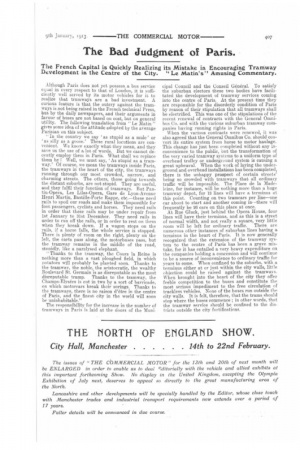The Bad Judgment of Paris.
Page 9

If you've noticed an error in this article please click here to report it so we can fix it.
The French Capital is Quickly Realizing its Mistake in Encouraging Tramway Development in the Centre ot the City. " Le Matin's' Amusing Commentary.
Although Paris does not yet possess.a bus service equal in every respect to that of London, it is sufficiently well served by its motor vehicles for it to realize that tramways are a bad investment. A curious feature is that the outcry against the tramways is not being raised in the French technical Press, but by the daily newspapers, and their arguments in favour of buses are not based on cost, but on general utility. The following translation from "Le Matin" gives some idea of the attitude adopted by the average Parisian on this subject. In the country we say 'as stupid as a mule' or 'as silly as a goose.' These rural locutions are convenient. We know exactly what they mean, and they save us the use of a. lot of words. But we cannot decently employ them in Paris. What shall we replace them by ? Well, we must say, As stupid as a tramway.' Of course, we mean the tramways inside Paris, the tramways in the heart of the city, the tramways running through our most crowded, narrow, and charming streets. The others, those going towards the distant suburbs, are not stupid. They are useful, and they fulfil their function of tramways. But Pantin-Opera, Les Lilas-Opera, Gare de Lyon-Avenue Henri Martin, Bastille-Porte Rappe, etc.—these need rails to spoil our roads and make them impossible for foot passengers, cyclists and horses. They need rails in order that these rails may be under repair from 1st January to 31st December. They need rails in order to run off the rails, or in order to rest on them when they break down. If a wagon stops on the rails, if a horse fails, the whole service is stopped. There is plenty of room on the right, plenty on the left, the carts pass along, the motorbuses pass, but the tramway remains in the middle of the road, stupidly, like a paralysed elephant. "Thanks to the tramway, the Cours la Reine is nothing more than a vast ploughed field, in which potatoes will probably be planted soon. Thanks to the tramway, the noble, the aristocratic, the wealthy Boulevard St. Germain is as disreputable as the most disreputable tramp. Thanks to the tramway, the Champs-Elysées is cut in two by a sort of barricade, on which motorcars break their springs. Thanks to the tramways, there is no raison d'etre in the centre of Paris, and the finest city in the world will soon be uninhabitable."
The responsibility for the increase in the number of tramways in Paris is laid at the doors of the Muni cipal Council and the Conseil General. To satisfy the suburban electors these two bodies have facilitated the development of tramway services coming into the centre of Paris. At the present time they are responsible for the disorderly condition of Paris by reason of their stipulation that all tramways shall be electrified. This was one of the stipulations of the recent renewal of contracts with the General Omnibus Co. arid with the various suburban tramway companies having running rights in Paris.
When the various contracts were renewed, it was also agreed that the General Omnibus Co. should convert its entire system from horse to motor haulage. This change has just been completed without any inconvenience to the public, but the transformation of the very varied tramway systems to a uniform type of overhead trolley or underground system is causing a great upheaval. When the work of laying the underground and overhead installations has been completed, there is the unhappy prospect of certain streets' being so crowded with tramways that all ordinary traffic will be impossible. The Place de la. Madeleine, for instance, will be nothing more than a huge tramway depot, for 13 lines will have a terminus at this point. Counting on two tramcars per line—one ear about to start and another coming in--there will frequently be 96 cars on this place at once. At Rue Gluck, just behind the Opera House, four lines will have their terminus, and as this is a street of normal width, and not really a square, very little room will be left for ordinary traffic. There are numerous other instances of suburban lines having a terminus in the heart of Paris. It is now generally recognized that the extension of the tramway systern to the centre of Paris has been a grave mistake, for it has entailed a very heavy expenditure on the companies holding a concession and will continue to be a source of inconvenience to ordinary traffic for years to come. When confined to the suburbs, with a terminus either at or just within the city walls, little objection could be raised against the tramways. When brought into the heart of the city they offer feeble competition to the buses and constitute the most serious impediment to the free circulation of trackless vehicles. None of the buses run outside the city walls. It is felt, therefore, that the trams should stop where the buses commence ; in other words, that the tramway service should be conined to the districts outside the city fortifications.




















